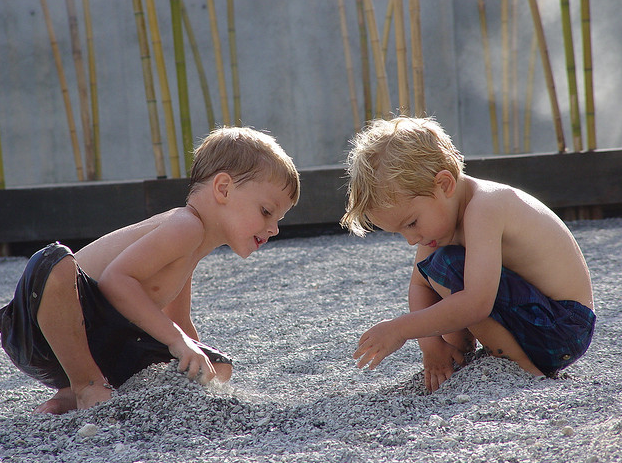In my daughter’s martial arts class at Life Ki-do, the instructor encourages students on a regular basis to focus on themselves, rather than on trying to “beat” another kid in the class.
“If I focus on beating Johnny,” he says, “I feel all tight and ‘icey’ inside. That does not feel good. But if I focus on myself and doing my very best, I feel like a river; I feel good and have fun.”
He encourages his students to help each other and to work together as a team. When it is time to get a drink of water he tells them: “Don’t rush to be the first one to get a drink of water. There is plenty of water for everyone. It feels so much better to make room for your friend to get to the water fountain first.”
There is a lot of wisdom in what we learn in kindergarten: to work together, to share. Why is it that we forget this as adults? Why is it that our culture regards kindness and compassion as weak?
I believe this is because of our culture’s infatuation with competition.
The conventional wisdom is that competition is a wonderful thing. It is one of the cornerstones of a free market economy. Through competition the “best and brightest” float to the top.
Competition fuels innovation, creativity, and the improvement of existing products and services.
But is that how it actually works?
“In our quasi-religious fervor to compete, we have expected fabulous efficiencies, miraculous economies, infinite creativity, and dazzling innovation. Instead, we have found ourselves gasping for air in a sea of corruption, dysfunction, environmental degradation, waste, disenchantment, and inequality—and the harder we compete the more unequal we become.” ~ Margaret Heffernan
Prominent businesswoman and author Margaret Heffernan has extensively studied competition and describes in her book A Bigger Prize how competition actually impedes innovation and creativity.
Yet, because we believe so fervently in the benefits of competition it has influenced all spheres of life, especially education and the workplace.
Heffernan describes how competition is actually undermining the love of learning and breeds an environment of cheating and cutting corners. In the workplace, competition tends to go hand-in-hand with vertical power structures, which comes at a tremendous cost for wellbeing.
Heffernan notes that in vertical power structures people at the top and the bottom of the hierarchy tend to experience more stress. Particularly people at the bottom typically suffer major health consequences and a significantly shortened lifespan… Yikes!
You may have experience working in an organization with a vertical power structure, I certainly have. Those were definitely not my favorite work experiences! In those types of organizations there are typically lots of nasty “office politics” going on: gossip, backstabbing and micromanaging. In those organizations it is very dangerous to speak up about processes and policies that do not work very well, and one is usually safest in keeping a low profile. This type of environment does not exactly encourage innovation.
“The problem … is not just that hypercompetitiveness is associated with all kinds of high costs and antisocial tendencies—bullying, narcissism, and Machiavellianism—but that it’s not associated with higher levels of success.” ~ Margaret Heffernan.
An environment that encourages highly competitive behavior undermines relationships and connection between people. Heffernan notes that people who engage in highly competitive behavior are so preoccupied with winning that they become very much focused on themselves. This creates difficulty with forming relationships with others. It undermines trust and collaboration.
“Trust, not rivalry, is what makes relationships and institutions effective and efficient. Trust is both what we need and what we create when we learn to work together.” ~ Margaret Heffernan
The costs of a highly competitive work environment do not end with the people who work for these organizations. The competitive mentality has ramifications that reverberate throughout society.
Because we assume that the only way we can succeed in a career is to be competitive, we have set up our school systems in a highly competitive way as well (think of the emphasis on test scores, ranking of schools, ranking of students, incentive pay for teachers, and the college admission process).
This causes great stress for students and their families. In my practice I work with a lot of teenagers who are suffering from anxiety disorders and depression due to a highly competitive school environment, and with families who experience stress and conflict centered on schoolwork and grades.
The competitive nature of business practices has led to environmentally destructive consequences. It is also at the root of the economic instability that comes from bubbles and busts.
But isn’t it human nature to be competitive? What is it good for? Heffernan echoes the research findings that Daniel Pink also describes: competition tends to be good for tasks that are simple, repetitive, and boring.
But the skills that we are relying on more and more in our complex society require creativity and collaboration.
For innovation and creativity to flourish, a horizontal power structure that encourages collaboration is much better. In her book, Heffernan gives plenty of examples of companies that have done just that. In these types of organizations, people freely share their ideas and debate is encouraged. The people who work for those companies tend to be happier, motivated and engaged at work.
What’s more, these businesses tend to be much more stable and successful in the long-term.
She writes about one of these organizations:
“What they did have was a burning sense of mission and a belief that jobs should offer people more than just a salary. They weren’t interested in motivating people with competition; they thought playing to human altruism—the opposite of competition—would prove most creative and long-lasting.” ~ Margaret Heffernan
The problems with competition seem to arise when it is not balanced with the recognition that all of us are interconnected and interdependent.
Human beings are a primarily social species, and as such we are very much dependent on each other for our survival and wellbeing. As human beings, we thrive and can accomplish great things when we work together. Thus, the exclusive emphasis on competition carries with it the danger of undermining our greatest strength.
“We have equal capacity for both collaboration and competition. Which of these gets attention and reinforcement depends on us, our families, and the society we inhabit.” ~ Margaret Heffernan
Below is a lecture by Margaret Heffernan that is very interesting and definitely worth your time! (Especially if you don’t have time to read her book, which is really good and well written!)
~
Love elephant and want to go steady?
Sign up for our (curated) daily and weekly newsletters!
~
~
Editor: Renee Picard
Photo: George in at Flickr







Read 0 comments and reply